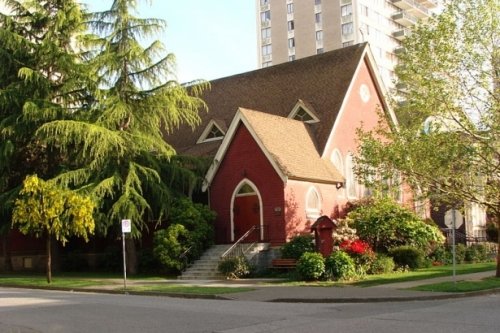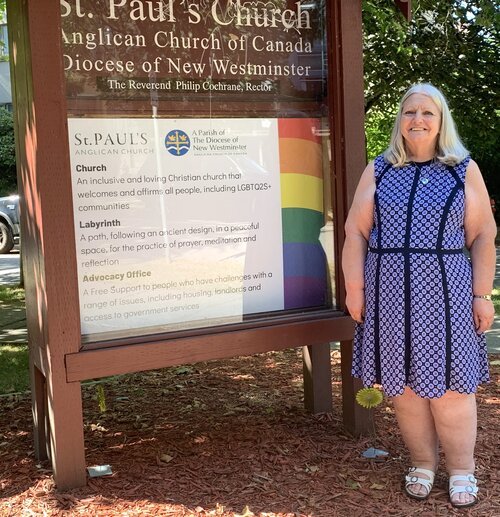THE TALK OF THE TOWN
/What Do We Have For You This Month?
Welcome to The Talk of The Town for March, 2022. Scroll through the following features (and click on images to enlarge) to find:
Our Lead Story: St. Paul’s Advocacy Office closes this month, and not everyone is pleased with the secrecy surrounding the decision.
West End News & Notes: A Community Hub survey by the community centre, a community-driven mural project.
West End Street Names: Most West End streets were named by CPR land commissioner and surveyor L.A. Hamilton. Here’s the story behind Burrard Street.
The West End - Coal Harbour In The News: The top stories of February with our community in the news.
Our Lead Story
ST. PAUL’S ADVOCACY OFFICE CLOSES THIS MONTH
27 Years of Community Service Come To An End
The West End’s historic St. Paul’s Anglican Church.
by Nate Lewis
For people in need of help of all kinds, one West End lifeline will no longer be available. In early February, St. Paul’s Anglican Church decided to shut down the long-running St. Paul’s Advocacy Office.
Located in the Church annex on Jervis Street, the Advocacy Office opened in 1995 with a budget of nine thousand dollars. Over the course of 27 years, volunteers and staff helped countless people through a variety of social services.
Jamie Phillips was referred to the Advocacy Office in the early aughts after experiencing sexual harassment and human-rights violations at her place of work. “The moment that I walked in that office, I stopped being a victim,” Phillips said.
“I felt like I had a lot of the best care… there were a lot of people working [on the case] and I would try to help out as much as I could – to what I was capable – I sort of got fired up, like I’m not the victim. I have these people,” Phillips remembered.
Most of the Advocacy Office’s work involves mediating landlord-tenant disputes, finding accommodation, and helping people access and stay on different government services such as social assistance, disability benefits, or housing applications.
According to St. Paul’s, the Advocacy Office advocates for individual clients, not specific issues or causes. “No client is turned away and no problem left unheard,” their website reads. The advocates and staff who work there were all volunteers, aside from director Ellen Silvergieter, who was paid at a part-time rate.
Ellen Silvergieter, longtime director at the Advocacy Office. Find The West End Journal’s interview last year with Ellen here.
Silvergieter estimates that when they were busy, the Office would see 3,800 to 4,000 clients in a year.
Providing technological assistance was also a big part of the job, according to Silvergieter, who pointed out that the applications for many benefits, like employment insurance and medical leave, are all digital. “Not everybody is good with computers, and unfortunately the government has made [assistance applications] connected to being good with computers,” Silvergieter said.
The Advocacy Office also assisted low-income clients in completing their yearly tax obligations. Silvergieter explained that benefits like guaranteed supplemental income for seniors, family and child benefits, and GST rebates are contingent on completing your taxes. “All of [those benefits] are tied with doing your income tax on time and every year,” Silvergieter noted.
While the Advocacy Office has shuttered its services, St. Paul’s will continue to operate the tax clinic.
However, the big question remains opaque: Why was the Advocacy Office closing? Phillip Cochrane has been the rector at St. Paul’s for three years. He said the Advocacy Office has absolutely “helped and transformed many people’s lives,” and has been of tremendous benefit to the community over the years. There has been “a significant investment by the Church,” both financially and in terms of resources over the last 27 years, Cochrane said.
The Advocacy Office has “been something that the parish has willingly supported to make it possible in terms of salary, accommodation, and office costs. That’s all paid for by the parish,” he added.
The church attempted to secure long-term funding for the Advocacy Office through grants. While they were unable to get the funding they were looking for, the church did receive a one-time grant from the Law Foundation of B.C. to conduct an external review of the Office’s services. Cochrane said that this sort of evaluation hadn’t been done since the program began.
The evaluation took place over nearly six months from mid-to-late 2021. According to Cochrane, this process included interviews with current and former volunteers and church officials, as well as a review of the existing landscape for assistance services in Vancouver, the needs of the local community and the challenges and opportunities that they currently face.
Another factor of note is that after 18 years as director and at the age of 70, Silvergieter had already decided to retire at the end of March, before the closure announcement was made. Cochrane said that decision brought clarity that the Church needed to get their heads around fundamental questions about the Advocacy Office’s purpose and goals.
“It’s perfectly sensible [that] any organization, before they recruited anybody else, would take stock of what’s going well, what’s not, what are the challenges, [and] what are we facing,” Cochrane explained.
Based on the results of the evaluation – which are confidential – the Parish Council came to a unanimous decision to discontinue the Advocacy program. However, that doesn’t mean it was an easy or pain-free decision, Cochrane said.
“Right now we are discontinuing it, but we are developing programming and support to better serve our locality,” he clarified. Cochrane said that their decision to continue to run the tax clinic was one example of that continued commitment to the community.
Cochrane mentioned issues of isolation, loneliness, and the need for family services as areas that the Church will be seeking to address through new programming.
Through collaborating with other not-for-profit organizations Cochrane hopes to avoid duplicating the services that others are providing. “None of us can afford to duplicate anymore,” he said.
For her part, Silvergieter knows the Church is planning to continue serving the community, but said she wishes they made a more concrete decision about what those programs would look like before closing the Advocacy Office. “It would make it easier, I guess, to accept if I knew exactly what they were going on to,” she said.
Robert Bach, who volunteered as a receptionist at the Advocacy Office, was shocked when he received an email from Cochrane informing parish members that it would be closed.
Bach, echoing Cochrane, said that staff were engaged in an evaluation process, but Bach believed that this was being conducted in an effort to improve the Advocacy Office and “help with its continuation.” Bach said he was told “the evaluation found information that included people's personal data and disclosing it might harm them.”
Both Bach and Silvergieter said they would like to have more details about the contents of the evaluation that led them to be shut down, but Silvergieter was clear she doesn’t feel the results of the evaluation should be made public.
“It should only be [shared with] Church management and maybe Parish members… I don’t think it’s something that [most] people would understand,” she said.
While Silvergieter personally wants more information about the closure and Bach sees it as an issue of transparency, not everyone who worked in the Office feels the need to drag out the process.
Long-time advocate Debbie Slater said, while she wishes they’d been around longer and she’s sympathetic to all her clients, she’s decided to move on. “I didn’t like it… [but] at some point everybody closes, and I’m going to close that section, that part of my life.”
“I’d rather go out with the feeling that I had a really good time,” Slater said. She will continue to work at the Advocacy Office, organizing clients’ pertinent information that the Office has kept over the years and getting it back into the hands of their former clients.
Cochrane pointed out that some existing cases will run on beyond March and the Church has accommodated that.
Slater thinks that some clients won’t know that the Office has closed. She’s told the clients she has spoken with that she’s still available to refer them to other advocacy services like the ones offered at First United Church.
Silvergieter felt there were no generalized support services like the Advocacy Office in the West End or in Vancouver as a whole.
David Scott, president of the West End Community Centre Association (WECCA) said he reached out to St. Paul’s on behalf of the Association to offer assistance during the transition. Scott said that WECCA could add more programming to their existing services to supplement some of what the Advocacy Office was doing, like their ESL programming for newcomers. However, most social services don’t fall within WECCA’s mandate to offer programming for recreational, educational and leisure activities.
Silvergeieter said she’s heard from many former and current clients about the closure. “A lot of them are just very sad, they’re very sorry. They don’t know what they’re going to do without us.”
Gratitude – for advocates, from clients, and for the opportunity to serve thousands of people who accessed advocacy services for over a quarter century – is palpable in this bittersweet time.
“Had I not come across St. Paul’s Advocacy I wouldn’t have [my family] and the life that I have today,” Phillips said.
“We're going to be missed from around the city. These [clients] were people that weren't just from the West End. These were people that came from all over Greater Vancouver,” Slater said.
The Advocacy Office will officially close on March 31, 2022.
For more on St. Paul’s Anglican Church and the Advocacy Office, you can find Leslie Buck’s historiography Peace be to the whole community: The story of St. Paul’s Anglican Church in the West End of Vancouver, at the Vancouver Public Library’s Joe Fortes and Central branches.
West End News & Notes
WITHER YOUR COMMUNITY CENTRE?
The latest round of City-led community consultation on the West End Community Hub project has wrapped up and now The West End Community Centre Association is seeking your thoughts and vision on this initiative.
You’ll find the latest survey here. Speak your mind!
Well-known Vancouver artist John Ferrie is leading the new West End Community Centre mural project.
LEAVING THEIR MARK ON THE WALL
by Lucas Pilleri
Photos by Ken Villeneuve
By the summer, four new murals will embellish the West End Community Centre on Denman Street.
Local artist John Ferrie has been commissioned to develop the murals, but his inspiration will be fuelled by the vision of four different community groups – little kids, pre-teens, teenagers, and seniors.
“The project directly involves members of the West End community who have been struck hard by the pandemic,” underlines a document shared by Linda Johnston, past president of the West End Community Centre Association, who continues to oversee the art committee.
The murals will be located by the entrance of the ice rink change room, outside the Barclay Room, at the front entrance, and inside the building. The interior mural will be transferred into the new building expected to arise in the next 10-15 years.
“To do four murals on a signature building in the West End was a dream come true for an artist,” says Ferrie, excited about the project. “You get to have your voice heard. It’s about leaving a great mark.”
To make sure this mark is right, visioning sessions took place last Fall with the aim of gathering insights from the four groups involved. The session with seniors has yet to happen, but teens and kids have already been consulted: “They talked about what imagery reflected them and their connections to the community,” says Robin Ottevanger, whose involvement as visioning coordinator is to engage the various groups.
Contributing artists share their visions.
The design of the murals will be directly inspired by these sessions: “Students focussed on friends and family, and the outdoors - the mountains, the ocean, the forest, and the activities in those environments,” adds Ottevanger. In addition to creating eye-catching murals in a high foot traffic area, artist John Ferrie will have to honor the vision of local participants.
“I want to make sure we cover the ideas they want to communicate on the murals. I had a lot of great light-bulb moments working with these great, articulate, cool teens. I’m really impressed to see what’s going to happen in the future with such minds,” says Ferrie.
The youngest participants even had the opportunity to paint on ceramic tiles that will be incorporated into one of the murals. “The two-year-olds and preschool enjoyed the extra art sessions and painted their tiles with confidence and enthusiasm. Some who were willing put handprints on their tiles” says Ottevanger.
While the final design of the murals still resides in John Ferrie’s creative mind, the artist has already started to tackle the 11 by 7-foot canvas that will be placed inside the community centre. “It will be a mosh pit design,” he ensures.
The four murals are expected to be completed by the Summer. King George High School Students could be invited to record video footage of the project and produce a short documentary.
West End Street Names
BURRARD STREET
Named for the inlet (which was called Sasamat by the Squamish nation) which in turn was named by Captain George Vancouver after a navy pal and sometime shipmate, Sir Harry Burrard-Neale (1765 - 1840). Sir Harry had been plain old Harry Burrard until he married into the wealthy Neale family and took on his wife’s name as well as her fortune.
Good old Harry was accused of incompetence during the war with Napoleon, but eventually rose to the rank of admiral. He never set foot on British Columbian soil.
For more West End street name histories visit our “Developing Stories” section here.
The West End - Coal Harbour In The News
MP Hedy Fry Supports Decision To Force Newsstand Owner Out Of Granville Island / Vancouver Sun / Feb. 22, 2022
Former Davie YIG Sues Employer / Fired For Feeding Homeless / The Province / Feb. 18, 2022
Barge on the Beach To Be Dismantled / Vancouver Sun / Feb. 7, 2022
St. Paul’s Advocacy Office To Close in March / The Province / Feb. 3, 2022






